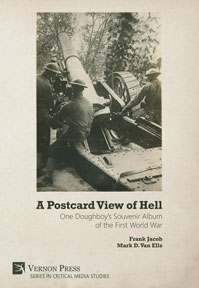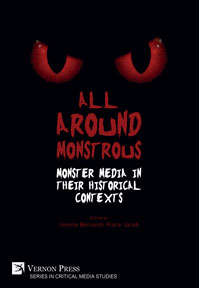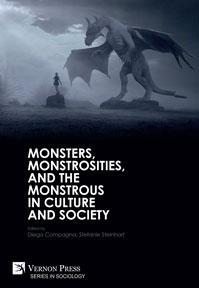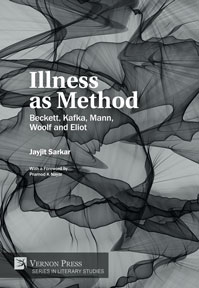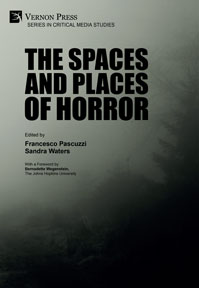Monstrous Ontologies: Politics Ethics Materiality
Caterina Nirta, Andrea Pavoni (Eds.)
by Sweta Rajan-Rankin (University of Kent), Jack Boulton (KU Leuven's IARA, Belgium), Ramón Córdova González (TU-Delft, Netherlands), Signe Perkone (TU-Delft, Netherlands), Vivian Asimos (Durham University), Paul Reid-Bowen (Bath Spa University), Carl Olsson (Newcastle University), Panos Kompatsiaris (University Higher School of Economics in Moscow, Russia), Andrea Mubi Brighenti (University of Trento), Aino-Kaisa Koistinen (University of Jyväskylä, Finland), Riccardo Baldissone (University of Westminster), Lucile Desblache (University of Roehampton), Ingvil Hellstrand (University of Stavanger, Norway), Line Henriksen (University of Copenhagen, Denmark), Donna McCormack (University of Surrey), Sara Orning (University of Oslo, Norway), Emanuele Prezioso (University of Oxford)
Purchase this book
(click here to change currency)
Thinking about the monster and the monstrosity means experiencing the limit. The monster is an experience of the limit. It is precisely here that the monster and the monstrosity question thought, its syntax and grammar. The monster constitutes the limit of an order of discourse and power because it signals the crisis of the devices that include, manage and control the difference. But, more radically, the monster implies an experience of the limit because it places thought and language in front of its own limits.
The monster's philosophical question is the possibility of thinking about the indefinable to which the monster refers. That is, thinking about the singular and multiple differences in such a way that they are not subjected to a signifying device that proceeds through distinctions, partitions and determinations.
The originality of this volume lies in differentiating itself from the solutions Cultural Studies have so far given the question of the monster and venturing into the open terrain of critical theory. Therefore, in accepting the challenge that the monster launches: that of an ontology of difference.
The stakes are high. It concerns the very possibility of a critical theory able to think the difference "differentially" and multiple thinking able to escape the dialectic of identity and the sovereignty of the One.
This volume has the strength of becoming an affirmative critique of the present, an ontology of difference as a monstrous possibility of the excess of the possible, avoiding specialisms and maintaining the multiplicity and problematic nature of languages. The result is a versatile and useful text both for those who study the subject and those who want to be stimulated by their own uncanny monstrosity.
Prof. Dr. Luciano Nuzzo
Università del Salento, Italy
[...] a valuable academic contribution to Philosophy and Monster Studies, and does manage to show new paths in the exploration of the monster and the monstrous, directing our attention to how the concept of the monster may be a useful tool to interpret the world that surrounds us.
[Extract from book review appearing on the 'Hungarian Journal of English and American Studies' February 2022. Reviewer: Pázmány Péter (Catholic University, Budapest)]
While the presence of monsters in popular culture is ever-increasing, their use as an explicit or implicit category to frame, stigmatise, and demonise the other is seemingly on the rise. At the same time, academic interest for monsters is ever-growing. Usually, monstrosity is understood as a category that emerges to signal a transgression to a given order; this approach has led to the demystification of the insidious characterisations of the (racial, sexual, physical) other as monstrous. While this effort has been necessary, its collateral effects have reduced the monstrous to a mere (socio-cultural) construction of the other: a dialectical framing that de facto deprives monstrosity from any reality. 'Monstrous Ontologies: Politics, Ethics, Materiality' proffers the necessity of challenging these monstrous otherings and their perverse socio-political effects, whilst also asserting that the monstrous is not simply an epistemological construct, but that it has an ontological reality.
There is a profound difference between monsters and monstrosity. While the former is an often sterile political and social simplification, the end-product of rhetorical and biopolitical apparatuses; the latter may be understood as a dimension that nurtures the un-definable, that is, that shows the limits of these apparatuses by embodying their material excess: not a 'cultural frame', but the limit to the very mechanism of 'framing'. The monstrous expresses the combining, hybridising, becoming, and creative potential of socio-natural life, albeit colouring this powerful vitalism with the dark hue of a fearful, disgusting, and ultimately indigestible reality that cannot simply be embraced with multicultural naivety. As such, it forces us towards radically changing not the categories, but the very mechanisms of categorisation through which reality is framed and acted upon. Here lies the profound ethical dimension that monstrosity forces us to acknowledge; here lies its profoundly political potential, one that cannot be unfolded by merely deconstructing monstrosity, and rather requires to engage with its uncomfortable, appalling, and revealing materiality.
This book will appeal to postgraduate students, PostDocs, and academics alike in the fields of philosophy, critical theory, humanities, sociology and social theory, criminology, human geography, and critical legal theory.
List of Figures
Acknowledgements
Contributors
Introduction
Caterina Nirta
University of Roehampton, UK
Andrea Pavoni
University Institute of Lisbon, Portugal
Chapter 1
Monster-Measures and Monstrous Values. A Short Reflection on the Foundations of Individual-Environmental Theory
Andrea Mubi Brighenti
University of Trento, Italy
Chapter 2
Learning to Live and Die in the Cthulhucene
Paul Reid-Bowen
Bath Spa University, UK
Chapter 3
Relating (To) Monstrosity and Hybridity: Translation and Interconnectedness in the Age of Hyperobjects
Lucile Desblache
University of Roehampton, UK
Chapter 4
Uranium as Monster in Swakopmund
Jack Boulton
KU Leuven's IARA, Belgium
Chapter 5
Monster as a Tool for Thinking. Learning from Spatial Practices in Abnormal Territories
Ramón Córdova González
TU-Delft, Netherlands
Signe Pērkone
TU-Delft, Netherlands
Chapter 6
Revisiting Deleuze’s Bestiary: What Difference Do Monsters Make?
Carl Olsson
Newcastle University, UK
Chapter 7
Do Revolutions Need Monsters? Ethnographic Fragments on Toxic Fish, Monstrosity and Social Justice
Panos Kompatsiaris
National Research University Higher School of Economics, Moscow, Russia
Chapter 8
Beyond Scientific Racism: Monstrous Ontologies and Hostile Environments
Sweta Rajan-Rankin
University of Kent, UK
Chapter 9
The Slender Man’s Ontology: Playing with Reality and Belief Online
Vivian Asimos
Durham University, UK
Chapter 10
Collective Voices and the Materialisation of Ideas: The Monster as Methods
The Monster Network
Chapter 11
Fleeing from Categories: Monstrous Artefacts and Style in Archaeology
Emanuele Prezioso
University of Oxford, UK
Chapter 12
The Unbearable Monstrosity of Being. On the Narrative Provincialization of Ontologies
Riccardo Baldissone
University of Westminster, UK
Index
Dr Caterina Nirta is a Senior Lecturer in the Department of Social Sciences at the University of Roehampton, UK. She received her PhD in Philosophy from the University of Westminster in 2014 and an MA in Media Communication and Cultural Studies from Goldsmiths College, University of London in 2006. Dr Nirta is the author of the book 'Marginal Bodies, Trans Utopias' (Routledge, 2018) and has published articles in journals including, Law and Critique, Lo Squaderno: Explorations in Space and Society, and Body and Society.
Andrea Pavoni is an assistant research professor at DINÂMIA'CET, Instituto Universitário de Lisboa, Portugal. Unfolding at the intersection between critical geography, social theory, and philosophy, his research explores the relation between materiality, normativity and aesthetics in the urban context. He is editor of the Law and the Senses Series (University of Westminster Press) and associate editor of the journal Lo Squaderno, Explorations in Space and Society. His book, Controlling Urban Events. Law, Ethics and the Material, is out on Routledge.
Ontology, monstrosity, body, space, monster
See also
Bibliographic Information
Book Title
Monstrous Ontologies: Politics Ethics Materiality
ISBN
978-1-62273-890-8
Edition
1st
Number of pages
255
Physical size
236mm x 160mm

![Monstrous Ontologies: Politics Ethics Materiality [Hardback]](/file/14150/2a73ddeb7fc122e0d5f4c516bb83dff7/1614935059.jpg)


